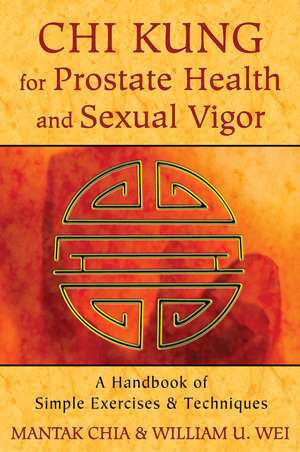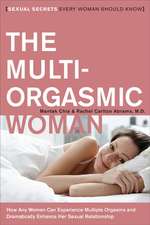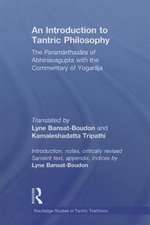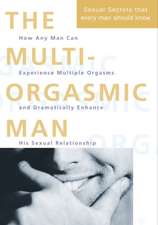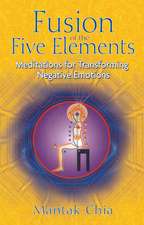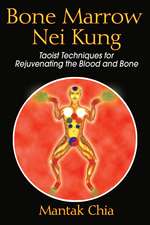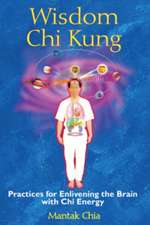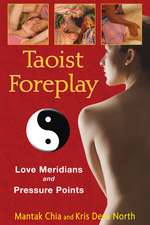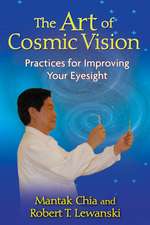Chi Kung for Prostate Health and Sexual Vigor: A Handbook of Simple Exercises and Techniques
Autor Mantak Chia, William U. Weien Limba Engleză Paperback – 2 noi 2013
Preț: 74.45 lei
Preț vechi: 100.92 lei
-26% Nou
14.25€ • 14.79$ • 11.88£
Carte disponibilă
Livrare economică 07-19 martie
Specificații
ISBN-10: 1620552272
Pagini: 176
Ilustrații: 112 b&w illustrations
Dimensiuni: 152 x 229 x 13 mm
Greutate: 0.23 kg
Ediția:Original.
Editura: Inner Traditions/Bear & Company
Colecția Destiny Books
Notă biografică
Mantak Chia, world-famous Inner Alchemy and Chi Kung master, founded the Universal Healing Tao System in 1979 and has taught and certified tens of thousands of students and instructors all over the world. The director of the Tao Garden Health Spa and Resort in northern Thailand, he is the author of 50 books, including Sexual Reflexology and the bestselling The Multi-Orgasmic Man. William U. Wei is a senior instructor of the Universal Healing Tao and has taught with Master Chia in more than 30 countries. He lives on a Taoist Sacred Meditation Mountain in southern Oregon.
Extras
Prostate Gland Exercises
For Taoists, sexual exercises are not merely a way to enhance sexual pleasure or become more attractive. These exercises are a means to enjoy a more vigorous and healthy body, a way to become sensitive to deeper and more intense emotions, and a way to cultivate spiritual energy.
In the East, as well as in the West, exercise is a crucial way to keep the body healthy. But when it comes to increasing sexual energy, the teachers of the East have taken exercise to a new level. To strengthen our sexual energy, and thus strengthen the senses and the whole body, the Eastern traditions have developed exercises that focus specifically on the sexual area. By strengthening the sexual organs (including the prostate gland) through exercise and massage, we actually affect the rest of the body and senses. There are pelvic exercises that greatly strengthen the reproductive organs and the complex network of tendons in the surrounding area. Strength in this department is of great importance; it is the root of both a man’s and a woman’s health.
THE PROSTATE GLAND
The prostate gland is an organ that is located at the base or outlet of the urinary bladder. The gland surrounds the first part of the urethra, the passage through which urine drains from the bladder to exit from the penis. One function of the prostate gland is to help control urination by pressing directly against the part of the urethra that it surrounds. The main function of the prostate gland is to produce some of the substances that are found in normal semen, the fluid that transports the sperm to assist with reproduction.
In a young man, the normal prostate gland is the size of a walnut. During normal aging, however, the gland usually grows larger. This hormone-related enlargement is called benign prostatic hyperplasia (BPH). Though this condition is not associated with prostate cancer, both BPH and prostate cancer can cause similar problems in older men. An enlarged prostate gland can squeeze or impinge on the outlet of the bladder or the urethra, leading to difficulty with urination. The resulting symptoms commonly include slowing of the urinary stream and urinating more frequently, particularly at night.
Prostate cancer is a form of cancer that develops in the prostate gland. Most prostate cancers are slow growing; however, there are cases of aggressive prostate cancers. The cancer cells may metastasize from the prostate to other parts of the body, particularly the bones and lymph nodes. In addition to causing difficulty with urination, prostate cancer may cause pain, problems during sexual intercourse, or erectile dysfunction. Prostate cancer tends to develop in men over the age of fifty. It is the most common malignancy in American men and the second leading cause of deaths from cancer, after lung cancer.
Through the Prostate Chi Kung daily practices you will be able to break up any energetic blockages in the pelvic region, open up the energetic pathways, and preserve prostate gland functional ability to an advanced age, maintaining your sexual life without discomfort, pain, or malfunction.
Exercising Your PC Muscle
Exercising your pubococcygeus (PC) muscle will develop your ejaculatory control, which will prevent the premature urge to ejaculate. It will also enhance the ability to achieve hard erections; improve blood circulation for enhanced size and sensation; drastically improve sexual stamina; increase ejaculation volume and intensity, improve urinary flow, and convey the ability to have multiple orgasms. And it can actually help save your life by giving you a well-developed, healthy prostate.
The first step to beginning your PC workout is locating your PC muscle. Some men have been able to locate their PC muscle for years without knowing it. If you can make your penis move on its own when you have an erection, you have located your PC muscle. If you cannot do this, the next time you urinate, stop the flow of urine before you finish. The muscle you use to stop yourself from urinating is the PC muscle.
Men can enhance their sexual prowess and energy by doing at least 200 to 500 PC flexes a day. Ancient Taoists called this exercise “tightening the anus” because flexing the PC muscle also makes your anus tight. Try doing 10 to 20 flexes to see how well you can focus on them. If your PC feels tired after 20 flexes, you are very out of shape.
PC Muscle Chi Exercises
Warming Up
1. Start out by squeezing and relaxing your PC muscle at a steady pace for a good 30 flexes.
2. At the end of the set, rest for 30 seconds.
3. Continue with 2 more sets, resting for 30 seconds between each set.
After completing 3 sets, you should have better control over your PC muscle due to the increased flow of blood and chi.
PC Clamps
1. Squeeze and release over and over again. Start with sets of 30 and build yourself up to sets of 100 or more.
2. Make sure you do at least 300 PC Clamps a day for the rest of your life.
The PC muscle heals quite quickly; you may find yourself waking up with a hard erection every morning. You will soon find that doing this exercise every day is the best move you could ever make for your sexual health and vitality.
Long Slow Squeeze
1. Warm up with a set of 30 clamps then flex as hard and as deep as you possibly can.
2. When you cannot squeeze any deeper, hold where you are for a count of 20.
3. Rest for 30 seconds.
4. Repeat 5 times.
After a month or so of exercising, you should be able to do squeeze-and-hold sessions for at least several minutes at a time. This particular exercise will give you erections of steel and the ability to last as long as you want in bed. You should eventually work your way up to 10 sets of 2-minute-long holds.
Cuprins
Acknowledgments
Putting Prostate Chi Kung into Practice
Introduction
1 Prostate Gland Exercises
2 Genital Massage
3 Chi Weight Lifting
4 Cleansing, Detox, and Nutrition for Prostate Health
5 Prostate Chi Kung Summary
Resources and Recommended Reading
About the Authors
The Universal Healing Tao System and Training Center
Index
Descriere
Age need not be a death sentence for men's sexual health and vitality. Taoist Master Mantak Chia and William U. Wei explain how to use the energetic and physical practice of Chi Kung to not only maintain a flourishing sex life well into old age but also reduce prostate enlargement and prevent prostate gland cancer. With fully illustrated step-by-step instructions, the authors provide exercises and techniques to open the energetic pathways connected to the male reproductive organs and clear the energy blockages that lead to sexual dysfunction and illness. They explain how to perform sexual energy and prostate gland massages and detail stretching exercises and the practice of chi weight lifting--attaching weights to the penis and scrotum to enhance sexual vigor. They explain that while these techniques are primarily preventive, they can also act to regenerate and restore function, forestalling the need for surgery in early stages of prostate disease. The authors present a routine of exercises to be practiced daily as well as guidance on supporting your practice with nutritional and herbal supplements.
